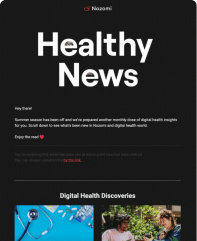Why do many people talk about AI so often? For instance, more than 93% of practicing specialists in the Digital Health field believe that ML-based processes can help uncover hidden or unattainable values in the healthcare industry.
Two factors play a role here:
1. The chance to save many lives faster and more effectively.
2. Investments in the industry: 35% of startups in the latest YCombinator batch are AI startups 🙂
But why is that?
How AI can be beneficial for healthcare startups?
Chat GPT-3 has shown that in certain areas, AI can significantly reduce the workload of busy professionals and drastically increase the scalability of products/companies.
If you’re a startup, it’s unlikely that you or your specialists/doctors have enough time or technical support to cater to all those in need through your application.
After all, most people concerned about their health need communication. They may not know their problems/symptoms or may not be aware of their progress/success in the Health Journey app.
In the case of patients not understanding their problems, it’s clear: most likely, a questionnaire is used, and if there’s AI in the app, it will simply determine your issue based on data and patterns from other patients.
For the App Health Journey situation, the approach is similar, except you won’t have to fill out anything; you’ll just be completing tasks: the algorithm will observe successes/failures and provide an optimal program.
And these are just the two most common cases! However, from these examples, we can already see how expenses and time for teams/users are reduced. In such cases, users heal/improve their health much faster. And these are real benefits of AI in healthcare apps.
But the main fear of startups is that AI is complicated and expensive. What are the challenges of implementing ai in healthcare apps?
Well, in reality, it’s not. Anyone who has dealt with Machine Learning understands that implementing it is not difficult. It’s more challenging to learn linear algebra and probability theory to work with AI 🙂
So, don’t worry about the complexity. In this article, AI Integration Consultant Dr. Umer Khan and our team explore how AI can assist in Digital Health and determine its relevance to your specific case.
By the way, before we dive into our article, for keeping track of emerging AI and technology trends in the healthcare industry, you can explore our selection of 100 resources (books, guides, websites, and influencers) about Product Management, UX, Technology, Healthcare market trends, and Product Marketing.
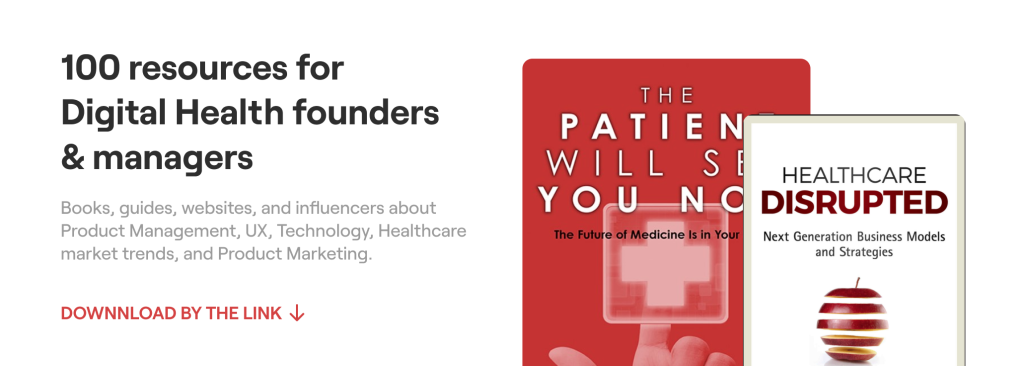
Download List of 100 resources for digital health startup founders & managers
I. Emotional Connection: as a patient, I sometimes don’t feel empathy…
Paradoxically, AI is often more empathetic in communication than humans.
1. AI chatbots can sometimes be more effective in communication than real people: for example, try talking to Chat GPT-3 about your problems, and you’ll see that it can express sympathy and provide genuine uplifting advice.
In our field, there’s a developed mental health application created in collaboration with Microshift, which recently released an AI feature.
For context, what is the application of our partner: Microshift is a Swedish mental health platform that helps people shift into a reflective state and develop a habit of focusing on what matters most. They achieve this through meditative audio sessions and continuous nudges for feedback on the user’s current state.
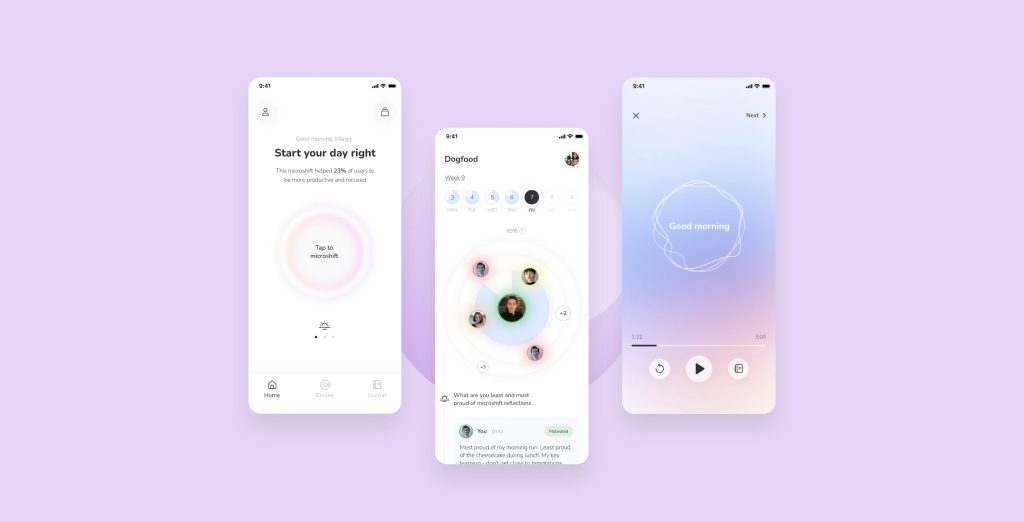
Learn how we’ve built mental health platform for Swedish startup
Their new feature is an AI-coach chat, similar to the story with GPT-3 mentioned earlier, but more specialized and integrated into the entire ecosystem of the application.
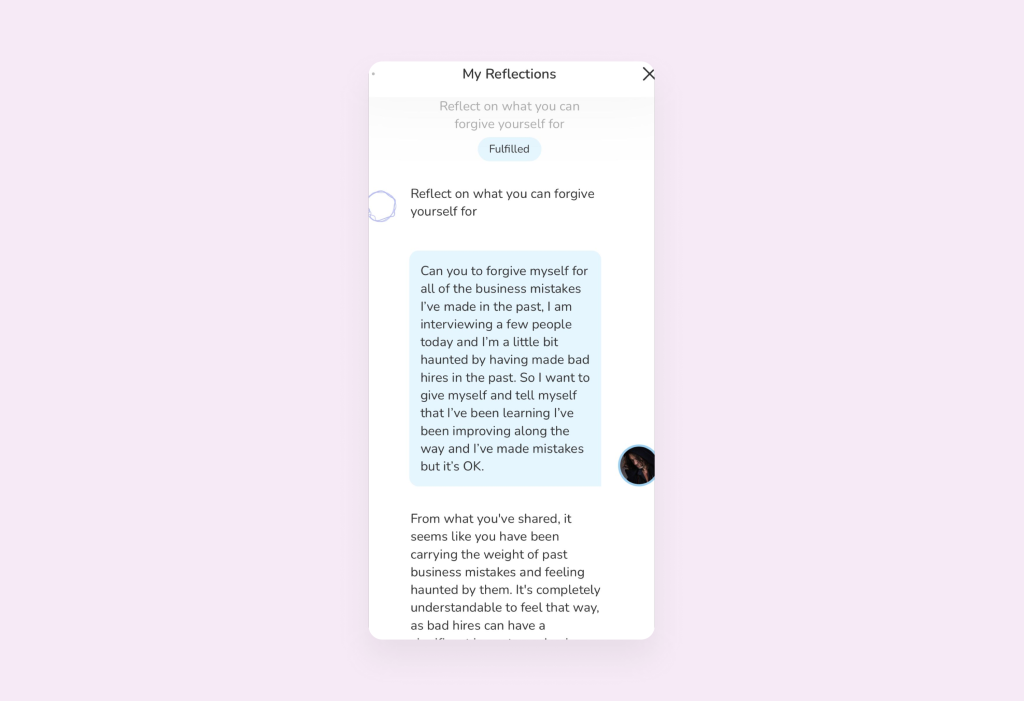
In this case, a real-life coach may not even be necessary, and users’ health outcomes can be improved without additional efforts.
But people can get tired of writing lengthy messages with advice or might need frequent replacements. On the other hand, AI is always ready to assist you 🙂
It was one of the types of AI in health care. What about the others?
2. AI can classify emotions: data collection is essential for decision-making. However, making decisions becomes challenging if the data is not properly organized.
A well-trained AI system can effectively distribute and classify data, allowing for personalized content delivery to specific user segments based on their behavior patterns and results.
Artificial intelligence in health apps can even segment users based on their emotions. For example, the well-known app LUCID uses AI to create personalized music for people with dementia.
Image Credits: Youtube channel “LUCID”
But how does it determine what to provide to each user? LUCID utilizes biometric and self-assessment data to classify emotional states.
Again, it may seem complex to implement and you may ask how to implement such AI in healthcare apps, but it’s a matter of knowledge rather than the process itself 🙂
II. Diagnosis: now I will recover faster and… this is one of the important types of AI in healthcare
How else AI can be beneficial to healthcare startups: according to Accenture, more than 69% of healthcare companies are currently implementing or testing AI solutions to aid in administrative tasks and support preliminary diagnosis.
1. Pre-diagnosis (for patients): have you ever experienced a lack of trust in a doctor or a clinic? In the sense that it seemed like they were prescribing unnecessary expensive tests, even though the symptoms were clear.
To “be prepared” for a visit, people often use symptom checkers. And the best of them utilize AI mechanics.
Example: Ada is an AI-powered health assessment app. It asks users a series of questions about their symptoms and medical history to provide a personalized assessment of potential conditions.
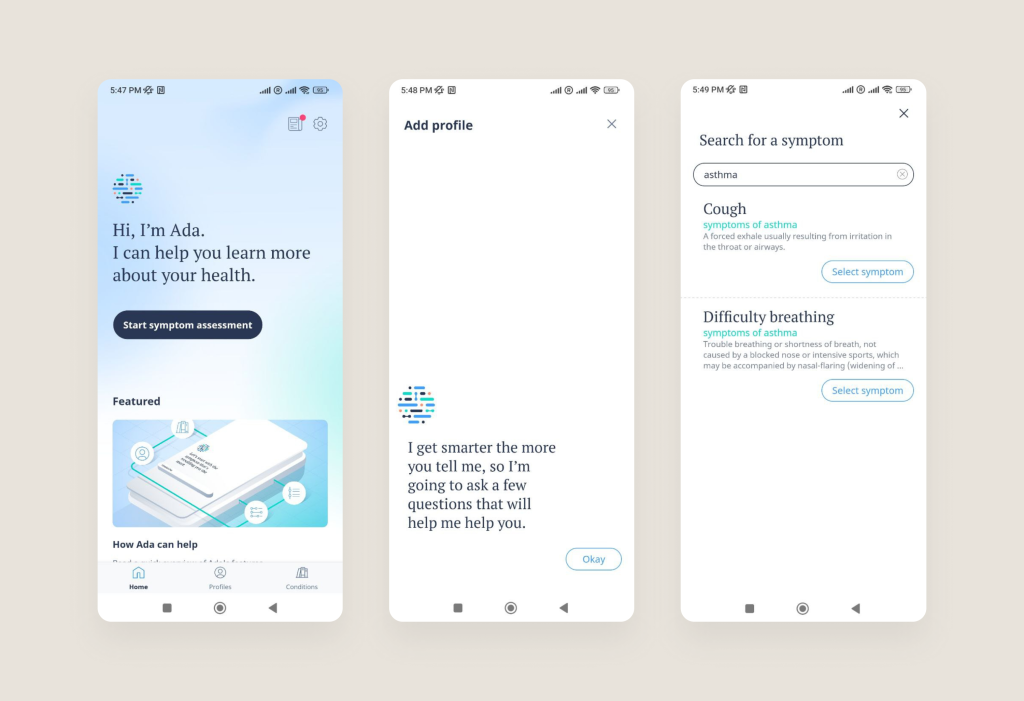
Source: Ada
In essence, a similar classification method is used here, but with a different approach in the form of questionnaires.
While in Mental Health, more complex issues are analyzed, often requiring additional devices or fruitful AI communication, in this case, the focus is on clear selection from multiple-choice answers.
2. Medicine Diagnostics (for doctors): as for the next applications of AI in healthcare apps, let’s take the side of the doctors. After all, in many cases, conducting tests and diagnostics directly by the doctor is essential.
But how can we simplify the process of handling tests and screenings? Modern AI systems enable doctors to identify diseases more quickly through analysis and comparison of the same database of images.
However (!!), it’s crucial to emphasize that no doctor should rely solely on AI and should double-check the analysis results.
Essentially, this approach frees up the doctors’ time and increases patient throughput, allowing a higher chance of treating more people.
For instance, in early 2020, Google’s DeepMind AI division introduced a deep learning model that outperformed the average radiologist by 11.5% and significantly reduced the workload of a second specialist in the British research system.
Another example is the DermEngine application, which uses AI in health apps in the form of image analysis to identify skin areas that may require further examination.
A regular doctor would spend quite a bit of time examining the photos, but AI can study everything within minutes or even less and often provide more accurate results.
As we can see, the focus here is on analyzing diverse types of data, such as text, photos, videos, audio, and more.
Moreover, diagnostics can be continuous, for example, through Remote Patient Monitoring. AI-enabled wearables and devices can continuously monitor a patient’s vital signs and health metrics.
The collected data can then be analyzed to notify healthcare providers of any abnormalities, enabling proactive interventions and reducing hospital readmissions.
In my years of experience in healthcare, I’ve witnessed firsthand the transformative power of AI in diagnostics. The recent advancements in AI, particularly in medical imaging and clinical microbiology, resonate deeply with my vision for future healthcare. The ability of AI tools to reduce errors and expedite accurate results is not just a technological triumph but a paradigm shift in patient care.
For instance, in radiology, AI’s proficiency in analyzing X-rays, CT scans, and MRIs has revolutionized early detection and diagnosis. I recall a case where AI-enabled imaging helped identify a small, otherwise overlooked, tumor, leading to early intervention and a positive patient outcome. This experience reinforced my belief in the indispensable role of AI in diagnostics.
Moreover, the integration of AI in clinical microbiology is a topic close to my heart. The use of machine learning systems to identify microorganisms and predict clinical outcomes is a breakthrough. These systems utilize genomic data and microscopic imaging, areas where I have seen considerable progress during my career. The potential to use such technology for rapid and cost-effective disease diagnosis, like malaria, is a milestone in global health.
In the next section, we will provide an example that goes beyond typical Remote Patient Monitoring that offers…
III. Creating personalized treatment plans based on data: this approach ensures that I can significantly improve my patient outcomes.
AI knows more than we do. As Dr. Umer Khan said:
The concept of personalized treatment plans, empowered by AI, is a cornerstone of modern medicine and a subject I am particularly passionate about. AI’s capability to tailor treatment protocols based on a patient’s genetic makeup, lifestyle, and disease specifics is an incredible leap forward.
In my practice, I have seen AI’s efficacy in chronic disease management, where it goes beyond traditional care. AI’s real-time data analysis from wearable devices allows for dynamic treatment adjustments, significantly improving patient outcomes. In the mental wellness sector, the use of AI to interact with patient emotions through biofeedback is a remarkable advancement. I recall collaborating on a project where AI-driven stress management tools showed significant improvement in patient anxiety levels, showcasing the real-world impact of such technologies.
As a result, patient treatment or rehabilitation plans are statistically more effective: by analyzing the outcomes of other patients with similar patterns and issues, they can tailor programs accordingly.
For instance, we developed an AI-powered application for Sensae that precisely analyzes the user’s current condition and provides recommendations for further actions.
A bit of context: Sensae is a Danish mental wellness company helping people to manage stress & anxiety by using AI to interface with emotions through personalised haptic biofeedback.
Moreover! AI not only collects data based on user responses and completed exercises within the application. During app usage, users wear devices that gather information on their pulse, heart rate variability (HRV), and many other metrics.
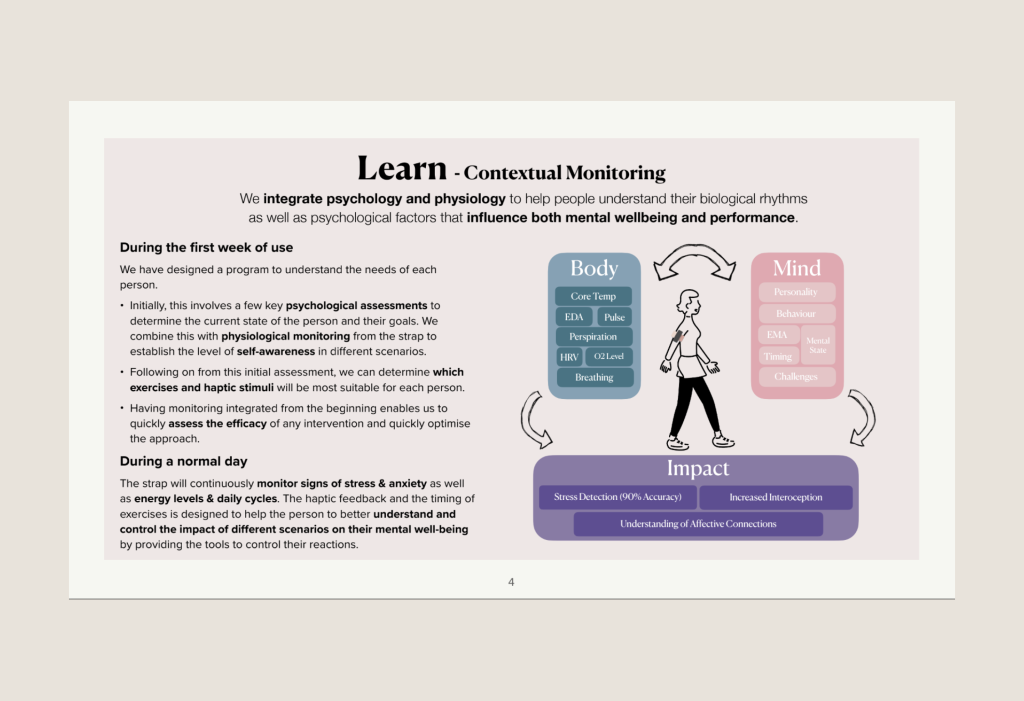
Then, this data goes through AI, and as a result, analytics are generated with an assessment of the user’s current state and recommendations for further actions.
Subsequently, this analytics can be deciphered by doctors during user visits, or users can independently access and review the results.
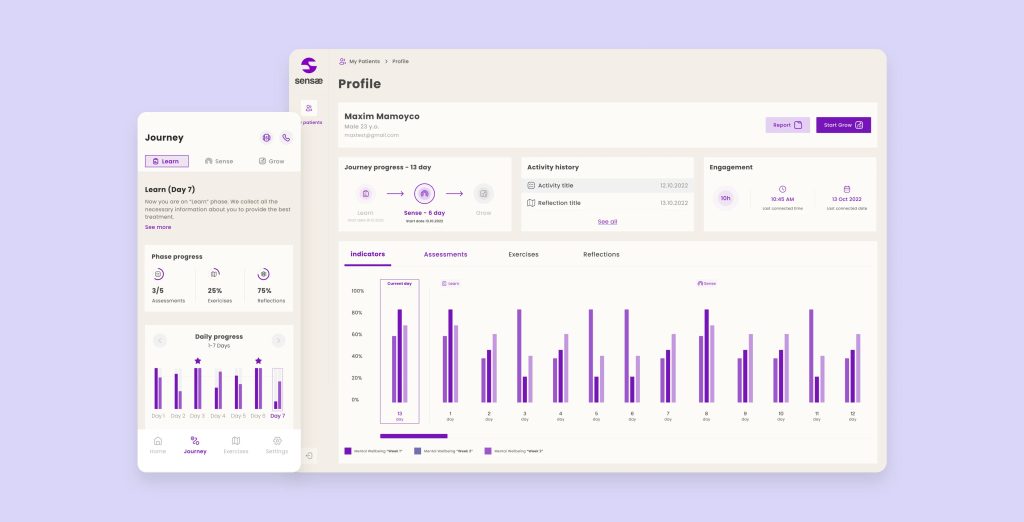
Learn how we’ve built AI health platform for Danish company
By the way! In the future, there are plans to personalize haptic bio-feedback: in other words, the device will adapt to the user’s current state and quickly provide the necessary exercises.
These exercises will include haptics, which are vibrations that will guide the user in performing certain actions (for example, taking a deep breath).
And let’s emphasize it again because it’s important! The final diagnosis should always be made by a doctor. Only then can artificial intelligence accurately tailor the appropriate program.
IV. And enhancing patient engagement & experience through AI
As Dr. Umer Khan said: finally, the enhancement of patient engagement and experience through AI is a subject I find particularly compelling. The implementation of AI in patient communication and support systems is a game-changer. AI-powered chatbots, for example, offer a level of interaction and personalized care that was previously unattainable. They provide patients with immediate, reliable health information, making healthcare more accessible.
My experience with a telemedicine platform utilizing AI for patient interaction demonstrated the profound impact on patient satisfaction and engagement. It’s not just about providing medical information; it’s about creating a supportive, understanding environment for patients, which is crucial for successful treatment outcomes.
In conclusion, my vision for AI in healthcare is not just focused on technological advancement but on its potential to transform patient care, making it more precise, personalized, and patient-centric. The integration of AI in healthcare is a journey we are just beginning, and I am excited about the possibilities it holds for improving lives and healthcare outcomes globally.
By the way, here we’ve also covered how to implement AI in healthcare apps
————————————————————————————————————————————————

We hope our article was useful for you!
Who are we? We are a Digital Health Product Studio, who transforms healthcare digital experiences and sets new standards for delivering digital healthcare in a way that positively impacts people’s lives.
We assist healthcare startups in designing and developing digital products, while also helping healthcare organizations undergo transformative changes. If you are interested about our experience check our case studies by the link or check a book about our approach.
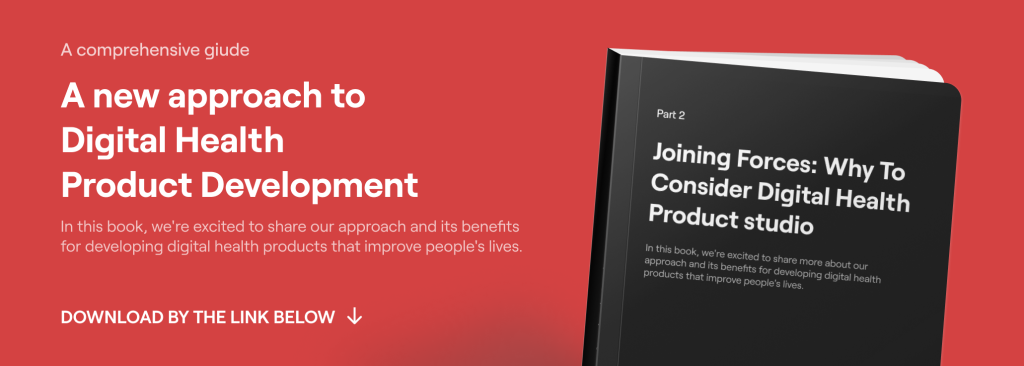
Learn how we create impactful products and resolve challenges of implementing AI in healthcare apps
Or write to us now and we will discuss how we can help ensure that your product brings real benefits 🙂






